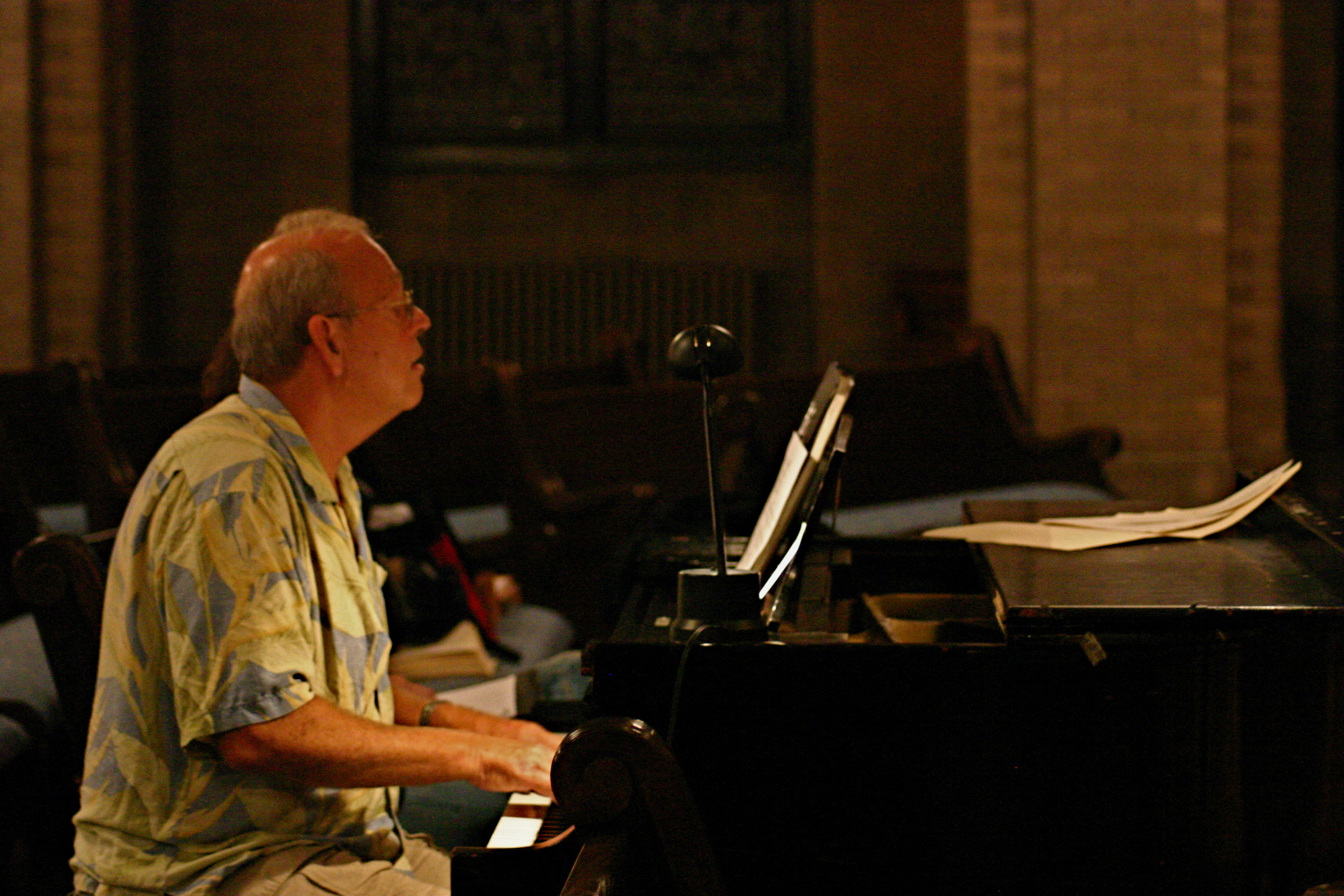Piano in choral rehearsals
 When I conducted college choirs, money was provided for rehearsal accompanists, so I always had one. Most were not thrilled to work with me---I did not let them play very much. Pianists want to play; the better they read and play, the more they wish to be constantly active.
When I conducted college choirs, money was provided for rehearsal accompanists, so I always had one. Most were not thrilled to work with me---I did not let them play very much. Pianists want to play; the better they read and play, the more they wish to be constantly active.
My principle college conductor, Weston Noble, used a pianist very sparingly. Our choir was large, 70-75 singers; we sang primarily a cappella music, we rehearsed five times a week, and we had ridiculously high standards. Mr. Noble felt that piano accompaniment, past warm-ups, initial pitches, and help in learning difficult passages, would actually weaken our learning, and our final product. Never, ever, did the pianist "just play along," supporting the group's singing. Even when we worked on music which would be accompanied in performance, we would learn it without keyboard help. This enabled the conductor to hear what was happening; it also forced singers to be responsible for their own pitches and rhythms. Singers are great followers---they love to hear the note first, then chime in; this doesn't promote good musical training, and contributes to epidemic fuzziness of attack, of rhythmic precision, of pitch accuracy---the very aspects of our craft which instrumentalists, in particular, ridicule and complain about.
I have never, since that college experience, worked with a choir which had such leisure to learn its music, or its craft. The larger, more professional choirs with which I have sung---Chicago Symphony Chorus, Grant Park Chorus, Robert Shaw Festival Singers, Oregon Bach Festival Chorus---employ expensive, skilled accompanists, who are not only good pianists, but who are expected to read the conductor's mind: they know exactly where he/she is in the score, understand immediately his/her priorities, anticipate problems, know when to play accompaniment, parts, or just sit out. The best seem to be adjunct to the conductor's persona, sharing even his/her musicality and sense of phrase. Robert Shaw would on occasion turn to his accompanist and tell him to model a phrase, and the pianist would do it flawlessly, providing with incredible efficiency exactly what was needed at the moment. And professional choristers, for the most part, are confident, skilled, and aggressive enough to know they must neither follow nor lead, but be in the right place at exactly the right time.
Under less than perfect circumstances, though---when rehearsal time is very limited, the score is particularly knotty, the transitions difficult, the singers tentative---even these professional accompanists will lead aggressively, just to get the job done and keep both the conductor and the singers feeling confident and reassured. This can lead to sloppy performance; at its worst---if the work being prepared is a cappella, for instance---it can lead to disaster, when the singers are deprived of keyboard support in performance. When singers become rattled and insecure, the disciplines which make up good singing---beauty of tone, solid pitch and rhythm, careful diction, ensemble listening, and communicativeness---go right out the window; they have nothing concrete, no fixed instrument, to hold on to, and they flounder. Again an example from my years with Mr. Shaw: one summer late in his life, we prepared a concert which included both the Vaughan Williams Mass in G and the Howells Requiem, very quickly. Embarrassingly, we fell apart during our first performance; and I had no doubt that the ubiquitous use of piano during rehearsals contributed greatly to this.
This latter scenario is particularly true of amateur choruses. I share Mr. Shaw’s conviction that such groups can sound as good as, and even better, on occasion, than, professional groups; but the individual singers lack the quickness, the confidence, the skills, of professional singers, and need far more rehearsal, repetition, drilling, than professional choristers. In many instances they function by hearing first, then following a split second later, and tend to sing that way habitually---which brings us back to the accompanist issue.
Perhaps because my experience under Weston Noble was so lasting and significant (he was a great teacher), I follow his model in utilizing an accompanist. If Chorale, or CMAC, had sufficient money to hire a regular, professional accompanist, I would use one, and I would expect that pianist to be in lock-step with my procedures and goals. I really require that my singers, like professionals, neither lead nor follow, but head all in the same direction, at the same time; and they can't learn to do this, if they are being helped and lead indiscriminately, the ensemble loses, rather than gains. Chorale accomplishes what it undertakes through being challenged rather than through being accommodated.
